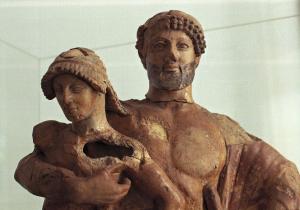
The God of the Bible is self-sufficient, but not self-centered. Take, for example, Jesus’ words to the rich young ruler in Matthew 19: “If you want to be perfect, go, sell your possessions, and give to the poor, and you will have treasure in heaven. Then come, follow me.” (Matthew 19:21; NIV)
Jesus doesn’t want the man’s money. He calls on the man to sell his possessions and give the proceeds to the poor. Rather than use the man to get at his resources to meet his own needs and desires, Jesus calls on the rich young ruler, released of the burden of his possessions that weighed him down, to share life with him as one of his followers.
What a stark contrast to those images of certain TV preachers who manipulate and fleece people of their money. Jesus doesn’t want the man’s money or need the man’s money. The poor are the beneficiaries, not Jesus. The God revealed in Jesus is self-sufficient. This God is not jealous of us, or greedy for gain, unlike the gods of Greek mythology, who often reflect humanity’s own depraved propensities.
Just because the God revealed in Jesus is self-sufficient does not mean God is self-centered. Here we find a stark contrast between the God of the Bible and the God(s) of the Greek philosophers, too. Referencing Étienne Gilson’s assessment of the fundamental difference between the God of the Bible and the Greek philosophers, Rufus Burrow writes, “The God of the Bible is most assuredly a personal God who is immanent enough to care about what happens to persons in the world, unlike the god of Epicurus, Cicero, and Aristotle, who seemed to be so distant, impassive, and uncaring regarding human beings in the world.”[1]
If God were self-centered, would he have sent his Son Jesus to the world, to lay down his life for others, to save us from ourselves at the greatest cost to himself? (John 3:16; John 15:33). No, he demands much of himself. Yet, he also demands much of us in return.
Peter understands well the import of Jesus’ call on those who would follow him. He and the other disciples have left everything to follow Jesus (Matthew 19:27). What a far cry from Moralistic Therapeutic Deism. As Christian Smith writes, “This God is not demanding. He actually can’t be, since his job is to solve our problems and make people feel good. In short, God is something like a combination Divine Butler and Cosmic Therapist—he is always on call, takes care of any problems that arise, professionally helps his people to feel better about themselves, and does not become too personally involved in the process.”[2]
The God of the Bible is self-sufficient, not self-centered, demands much of himself, and from those who would follow him. The kind of demand we find here is communal in nature, not commodifying. He does not want a pound of flesh. This God who comes to us in the flesh wants our hearts and abiding relational connection with us now and throughout eternity.
_______________
[1]Rufus Burrow, Rufus Burrow Jr., God and Human Dignity: The Personalism, Theology, and Ethics of Martin Luther King, Jr. (Notre Dame, IN: University of Notre Dame Press, 2006), 109. See also n72, which is a reference to Étienne Gilson’s God and Philosophy (New Haven, CT: Yale University Press, 1941), chap. 1. “God and Greek Philosophy,” especially 34-37.
[2]Refer to Christian Smith, “‘Moralistic Therapeutic Deism’ as U.S. Teenagers’ Actual, Tacit, De Facto Religious Faith,” in Princeton Lectures on Youth, Church, and Culture, 2005 (Princeton, NJ: Princeton Theological Seminary, 2005), 49-50.













